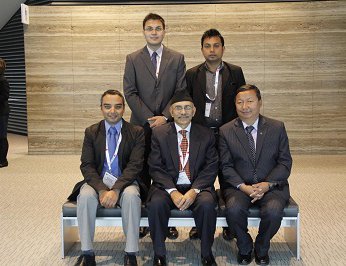
I was overwhelmed by the prospect of attending the International Bar Association (IBA) conference in Tokyo, where a 5,000-strong gathering of lawyers was expected. Along with six other young lawyers, I had received a scholarship to attend the conference. Advocate Mohan Ingnam, Nepal Bar Association treasurer, led the team of eight of us to the conference held between October 19 and 24, 2014. The objectives of the scholarship were to encourage lawyers from countries like Nepal to participate in the conference and understand the contemporary global legal issues, to get to know the structure of IBA, to facilitate business opportunities through different meetings and to encourage taking membership of the IBA.
On 19 October, there was a grand opening ceremony. Michael J Reynolds, the outgoing President of the IBA, informed the gathering during his welcome speech that there were about 6,300 lawyers who had registered for the IBA conference. At the announcement, made amidst the gracious presence of the Japanese Emperor and Empress, along with Prime Minister Shinzo Abe, there was a thunderous applause from the gathering of 6,000 odd lawyers. The sound still echoes in my head.
The simplicity of the Emperor and Empress of Japan was worth noticing. Prime Minister Abe made a brief speech highlighting the importance of rule of law and emphasizing that the concept was universal in nature. There was a dinner reception at the end of the day. Apart from the lavishness and delicious food, what touched me the most was the ability of an elderly waiter to fetch a glass of juice for me amidst thousands of people in the crowd for whom he was serving as well. I soon realized that the Japanese hospitality is unparalleled -- as they say a tree full of fruits always bows low. So are the Japanese people. The more developed they are the more humble they have become. They are ignorant about the word arrogance. For them it does not exist. Nepalese people are themselves warm and courteous and hospitable but Japanese surpass them in every manner with a tinge of sophistication.
There were fewer than 400 working sessions during the entire conference, let alone breakfast, luncheon and dinner meetings. On 20 October, many sessions were in progress simultaneously. I had to choose two for the day. One for the morning and the other for the afternoon. I attended the one which gave the young lawyers insightful tips on how to make the best of being in the conference. The second one was related to 'The business of water: key issues in investing in and financing of water and waste water projects'. I have to mention here that as I take keen interest on environmental issues I opted to attend most of the environmental sessions. There were other sessions on different issues happening simultaneously. Some issue sessions which I did not attend related to corporate law, criminal law, dispute resolution, financial service, human resource, insolvency, intellectual property, communication and technology, international sale, franchising and product law, law and individual rights, maritime and aviation law, public law, real estate and taxation to name a few, in a generic sense.
In the afternoon session, on the third day of the conference, I disagreed with the panelists. I always believed the environmental law was to protect, preserve and conserve the environment. However, the panelists talked about 'international environmental law consequences of natural resources and energy extraction'. They seemed to be in a little hurry to extract energy even without the consent of the indigenous communities. One of the panelists was against the veto power that the community could exercise in not giving consent. He thought a mere consultation to an informed consent was enough rather than having full consent before any activity was carried on to extract energy.
This particular session wasn't inspiring given the grand size of the conference and questions came to my mind. 'Who are the panelists and how are they selected?'. Soon I was told that the panelists were lawyers from amongst the IBA members. Very few were brought from outside the IBA.
Former President of Ireland Mary Robinson, former President of the Maldives Mohamed Nasheed, former Vice President of the USA Al Gore were some of the personalities who were inspiring. There were others as well but because I attended their sessions I can boast of having listened to them.
I attended morning and afternoon sessions throughout the week. However, I have my own story to tell as to how sleepy I was on the last day while attending the Rule of Law Symposium after the night before party at ELE TOKYO.

Abhishekh Adhikari
Adhikari is an advocate
- Once Again A Trip To Poonhill
- Mar 18, 2024
- A Trek To The Lesser Trodden Ruby Valley
- Mar 28, 2022
- A Complete Trip, Personally
- Jan 26, 2020
- Mesmerizing Mountains: Machhapuchure, Annapurna South and Himchuli
- Apr 18, 2019
- Climate Change: Think Globally Act Locally
- Jan 12, 2019















